ABOUT THE BOOK
The question What do I want to do with my life is more difficult to answer for todays twenty-somethings than it was for their parentsnot only do todays jobs look different, but career paths are altogether less of a sure thing. Its in this modern context that Lodro Rinzler provides Generation Y with wisdom for approaching the whole issue of livelihoodnot only how to find work, but how to bring compassion and meaning into the job once youve got it. Its wisdom from the Buddhist tradition that works for anyone.
The book is divided into three parts: Part One focuses on deciding what you want to do with your life, job-wise and otherwise; Part Two explores how to be beneficial to others, beginning with those at your office and moving out to the world at large; and Part Three shows how to turn even the most difficult work situations into opportunities for awakening. Lodro has a gift for presenting the Buddhist teachings in a way thats practical, funny, and entertaining, but the book is ultimately quite serious: its about using your livelihood to wake up.
LODRO RINZLER is a teacher in the Shambhala tradition of Vajrayana Buddhism. He has taught numerous workshops and retreats. His column What Would Sid Do? (Sid = Siddhartha, the Buddha) appears regularly in the Huffington Post.
Sign up to receive news and special offers from Shambhala Publications.

Or visit us online to sign up at shambhala.com/eshambhala.
THE BUDDHA WALKS INTO
THE OFFICE
A GUIDE TO LIVELIHOOD
FOR A NEW GENERATION

Lodro Rinzler
 Shambhala / Boston & London / 2014
Shambhala / Boston & London / 2014
Shambhala Publications, Inc.
Horticultural Hall
300 Massachusetts Avenue
Boston, Massachusetts 02115
www.shambhala.com
2014 by Lodro Rinzler
All rights reserved. No part of this book may be reproduced in any form or by any means, electronic or mechanical, including photocopying, recording, or by any information storage and retrieval system, without permission in writing from the publisher.
Library of Congress Cataloging-in-Publication Data
Rinzler, Lodro.
The Buddha walks into the office: a guide to livelihood for a new generation / Lodro Rinzler.First edition.
pages cm
Includes bibliographical references and index.
eISBN 978-0-8348-2990-9 (ebook)
ISBN 978-1-61180-061-6 (alk. paper)
1. BusinessReligious aspectsBuddhism.
2. Interpersonal relationsReligious aspectsBuddhism.
3. Quality of work life. 4. Spiritual lifeBuddhism.
I. Title.
BQ4570.B86R56 2014
294.3444dc23
2013043415
In memory of my father, Carl Rinzler
CONTENTS
Sometimes at work people are jerks. Sometimes you are one of them. This book is about how not to be a jerk (which, in retrospect, might have been a better title) and how to work with others in your office so that mindfulness and empathy can flourish.
After my first book, The Buddha Walks into a Bar, came out, I found myself being viewed as the Buddhist author equivalent of George W. Bush. I myself was not fond of that gentlemans politics but remember clearly that when he was running for president, people seemed magnetized to him for a very specific reason: they could see themselves having a beer with that man.
For whatever reason, I think thats what happened to me. I didnt intend to write with a casual tone, but lets face it: Im not the most senior, learned teacher at your local monastery. Im a guy who has sat on his butt meditating for more hours than hell admit, has given some thought to how that meditation practice affects his life, and is good at drinking beer. So when people reached out to me after reading my first book, often they would invite me to have a drink with them the next time I was in town.
The thing is, more often than not, when you go out and get a beer with someone, you end up talking about work. If I get a beer with younger friends, we talk about what it means to be a young person finding your way, developing a livelihood that you feel good about. If I get a beer with friends who are not as young, we talk about how hard it is to apply meditation principles to our nine to five.
I realized that after the bar, theres the morning commute. Because in my travels people wanted so much to talk about applying Buddhism to the workplace, this seemed like a natural thing to discuss.
So this book is both a continuation of my first books and actually much more focused. Im not going to rehash every aspect of Buddhist philosophy from The Buddha Walks into a Bar or discuss as many topics as Walk Like a Buddha. Instead, were going to dive into the nitty-gritty work of work. How can you bring mindfulness, the act of being present, and compassion off the meditation cushion and into this place we spend most of our waking hours? Specifically, for those of you familiar with the various turnings of the wheel of dharma, or the Buddhas teachings, this is a book that deals with Mahayana teachings, that is, teachings on bringing an open mind and heart to all of our worldly interactions. This is a guidebook to becoming the kind of authentic leader this world needs.
I have been a meditation practitioner and instructor longer than I have been in the workforce, and thus the philosophy of Buddhism has permeated my own workplace interactions. Ultimately, that led me to found the Institute for Compassionate Leadership, a six-month training program that partners the philosophy offered in this book with other methodologies aimed at creating a new generation of openhearted and genuine individuals. The wisdom in this book is the small amount that I have been able to retain in my years of study with my Buddhist teachers and professional mentors. The rest of it is based in the fact that if there is a mistake to be made on the Buddhist pathor the path of office lifeI have likely made it and, often, learned from it.
All of this said, you let me know how it strikes you. Because, as was the case with the other books, the most important part is the conversation that comes after you read this book. I wrote it for you, and I continue to be here for you, so please reach out. Well get a beer and talk about work.
Lodro Rinzler
Thank you for taking the time to read this book; I hope you connect with it in some way.
Shambhala Publications has been a tremendous support for this book. I would like to thank Sara Bercholz for providing encouragement and space to work from, even though she insisted on taking photographic documentation of me passing out at my computer on a semiregular basis. My editor, Dave ONeal, has been such a joy to work with over these past few years. I am fascinated by his mind and his quick wit. I am lucky to have him. Jonathan Green has been my number-one fan and has been so patient with me as an author. Daniel Urban-Brown has designed the covers for my books, and I owe him a debt of gratitude. In fact, I am indebted to everyone at Shambhala.
I would like to acknowledge Susan Piver and Michael Carroll for their incredible care and mentorship throughout the process of this book/my professional life. Stephanie Tade is the best agent one could ask for in this business.
So many of my friends have been wonderful in encouraging my work as an author. With that in mind I would like to thank David Delcourt, Brett Eggleston, Oliver Tassinari, Ethan Nichtern, Will Conkling, Miranda Stone, Christine Espinoza, Josh Silberstein, Maron Greenleaf, David Perrin, Jeff Grow, Eric French, Matt Bonaccorso, Dilip Sidhu, Annie Colbert, Victoria Gerstman, and Noah Isaacs. Similarly, I would like to thank my parents, Beth and Carl Rinzler, as well as my brother, Michael, and my sister, Jane.
Next page
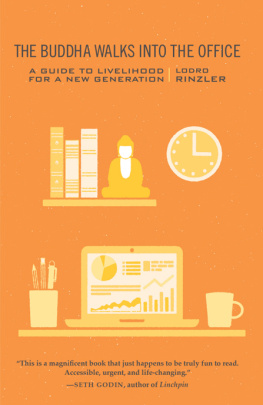

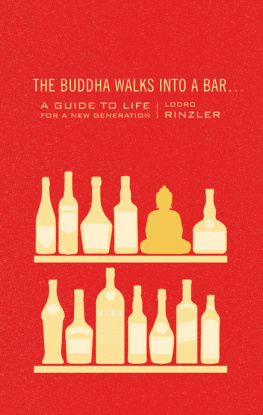


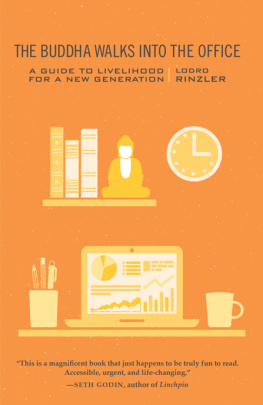
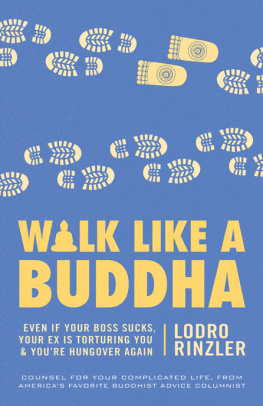
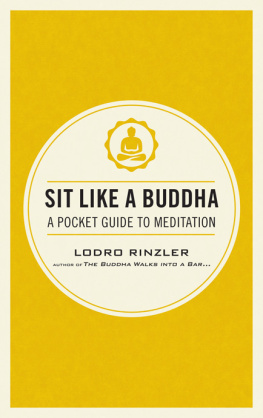
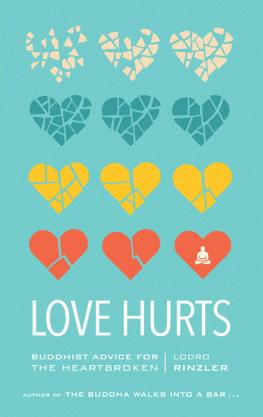
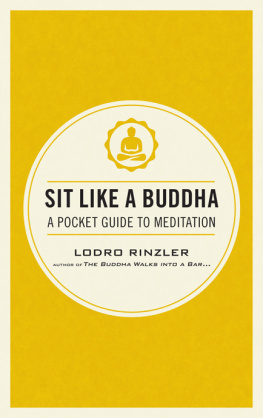
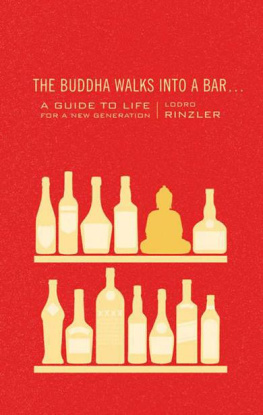
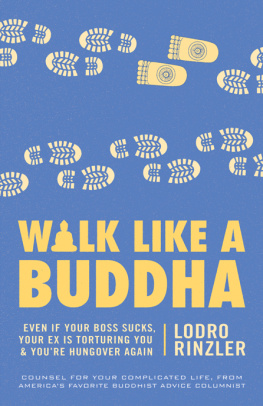


 Shambhala / Boston & London / 2014
Shambhala / Boston & London / 2014